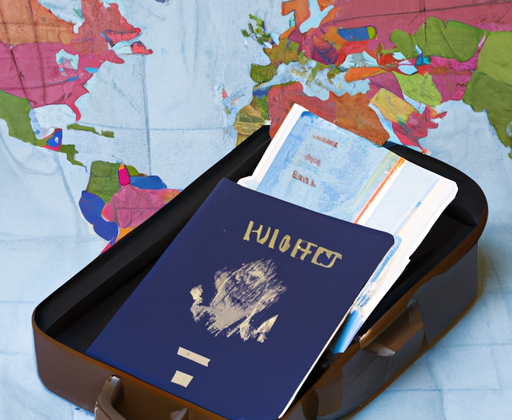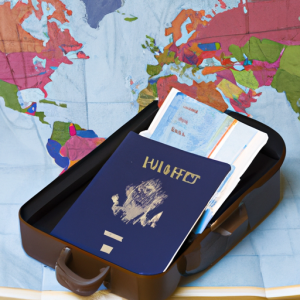
Introduction
Living abroad can be one of the best experiences a person could ever have. From experiencing different cultures to getting immense professional opportunities, there’s something for everyone. But all that doesn’t come without its downsides. Language barriers, feeling homesick, and financial strain are just some of the issues you might encounter when living abroad. In this article, we’re going to explore the pros and cons, as well as the things that make living abroad so difficult.
Advantages of Living Abroad
Hey there, wannabe globetrotter! Moving abroad can be an exciting and rewarding experience. It’s a chance to immerse yourself into a new culture, explore unfamiliar places, and create unforgettable memories. That said, it’s not for everyone. Here are some of the advantages of living abroad that might just entice you to take the plunge.
One of the most obvious advantages is the cultural experiences that come with living abroad. You’ve got the opportunity to drop what you know, learn from new perspectives, and grow as a person. The best part? You don’t have to book a flight just for the sake of sightseeing. All these experiences will come to you on a daily basis – right outside your doorstep!
Another advantage, which can often be overlooked, is professional opportunities. If you’re looking to break out of the rat-race and make it big in your industry, then moving abroad may just be the ticket. Not only do you get the chance to meet new people who share your passions, but you also get to prove yourself in a whole new business community and gain unique insights that you wouldn’t have had otherwise.
Disadvantages of Living Abroad
When it comes to living abroad, there are a lot of great potential benefits. But unfortunately, it also comes with its pitfalls. From language barriers and homesickness, to financial strain – here’s the lowdown on some of the biggest drawbacks of overseas living.
First, navigating new languages and cultures can be incredibly difficult. Even if you pick up the language quickly, it takes time to really become acclimated to an entirely different culture. In the meantime, you may be confronted with cultural misunderstandings or even hostilities. And while many people love the challenge of tackling a brand-new language, others find the language barrier to be overwhelmingly difficult and isolating.

On top of that, it’s natural to start feeling homesick when you’re away from friends and family for so long. One way to handle this is to keep in touch through video calls and social media – but for some, nothing ever quite compares to being able to physically hug those closest to you. Long distance relationships won’t always weather the storm either, leaving the expat feeling isolated and lonely in a foreign environment.
Finally, living abroad can really put a strain on your wallet. While there could be cost savings in terms of lower housing and living costs, these may be outweighed by the expenses associated with travel, visas, and other moving-related expenses. Plus, certain jobs might not be as well paid outside of your home country – leading to a major reduction in income.
The Hardest Thing About Living Abroad
So, you’re thinking of living and working abroad but there’s a lot that can be hard – adjusting to a new culture, being away from family, the language barrier… The list goes on. I get it; when I took a job in Shanghai I was scared! After living abroad for a few years now, I’m here to tell you: it ain’t all sunshine and daisies.
The biggest struggle? Adjusting to a new culture. You know how in America we greet people with a handshake or a hug and, if you’re from the south, say “bless your heart” when someone does something stupid? Well, that doesn’t fly overseas. Depending where you go there are customs you must learn and adhere to, otherwise you’ll offend—or even worse, get yourself in trouble.
Plus, let’s be honest – you’ll probably experience some loneliness. I mean, living away from your fam & friends can feel divvy at times. It feels like a piece of your heart is gone, y’know? Sure, there are FaceTime and Skype, but it isn’t the same. Personally, I’ve been known to suffer through some serious homesickness.
And don’t forget about mental health struggles. It’s easy to fall into a funk when you’re alone in a foreign country, thousands of miles away from home. Whether you need a therapist or medication, it’s important to remember that it’s ok to reach out and ask for help. In my experience, it’s made all the difference in terms of feeling acclimated and “at home.”
Living abroad can be a huge challenge – but also a great privilege. If you’re willing to put yourself out there, create connections, and trust the process, you just might discover a side of yourself you never knew (and like). So don’t be afraid – take a chance, because after all, life is too short not to have an adventure.
Wrapping it up
Living abroad can be a thrilling and rewarding experience, but it’s not always easy. As with any big change in lifestyle, there are some challenges to living abroad that you should know about before taking the leap. From language barriers to financial strain to feeling homesick, it could take some adjusting. But if you’re willing to roll with the punches and navigate a new culture, the rewards of living abroad could outweigh the difficulties.
At the end of the day, living abroad really comes down to how comfortable you are pushing yourself out of your comfort zone. If you’ve got a sense of wanderlust and want to challenge yourself, the world is yours for the taking — just know that the hardest thing about living abroad may not be the adventure itself, but rather the adjustment period upon embarking on one.
Living Abroad Challenges
What are some struggles of living abroad?
My experience of living abroad has been incredibly rewarding, but it can also be incredibly difficult. One of the hardest things about living abroad is adjusting to the culture shock. Everything from the language, the customs, the food, and the way of life can feel so different from what you’re used to. You have to learn how to navigate a new and unfamiliar environment, and how to deal with the frustrations and loneliness that can come with that. You also have to learn how to manage stress, as living in a different culture can be overwhelming. And lastly, you have to figure out how to take care of your basic needs and feel comfortable in your new home.
It can also be quite difficult to make friends in a foreign country, especially if you don’t speak the language fluently. You need to be able to have meaningful conversations and build social circles with people from different backgrounds. This requires patience and a willingness to invest time and energy in developing those relationships. It’s also important to be mindful of cultural differences and be respectful of customs, beliefs, and values that may be different from your own.
Finally, it can be a challenge to stay connected to family and friends back home. There can be a lot of hurdles to overcome, such as different time zones, language barriers, and technology issues. You may need to get creative and find new ways to stay in touch, like scheduling video calls, sending handwritten letters, and gathering online to watch movies or play games.
Living abroad is not easy, and it takes a lot of courage and resilience. But with a little bit of preparation, an open mind and an adventurous spirit, I’m confident that you can make it work and have an incredible experience.
Why is living abroad hard?
Living abroad is often a thrilling adventure, but it can also be an extremely difficult challenge. One of the hardest things about living abroad is dealing with cultural differences. I had to learn an entirely new set of customs and norms, which was both confusing and intimidating. I had to get used to the idea of living in a place where I was different from everyone else and this was incredibly challenging. Additionally, making friends with locals was difficult, as I wasn’t sure how to properly communicate my intentions with them. That said, I eventually learned to build relationships with people in the area and managed to make some lifelong friendships.
Another difficulty with living abroad was finding my footing in the job market. Coming from a place I knew so well, I struggled with finding a job and knowing how to navigate the local job landscape. I had to take the initiative to apply to all sorts of jobs, research labor laws, and figure out the best ways to showcase my skills to potential employers. Although it was a long and difficult process, ultimately I found an excellent job and was able to make a comfortable living.
Finally, one of the biggest struggles I faced was feeling isolated when I moved to a different country. I was cut off from the familiarity of home and all of my family and friends. I had to find ways to nurture connections with those back home while adjusting to my new environment. Fortunately, I eventually found a good support system in my new home, but it still took a lot of time and effort to build that support system.
Living abroad can be extremely challenging, but also incredibly rewarding. The hardest thing about living abroad is dealing with the unfamiliarity of a new culture and job market, as well as the loneliness of being away from home. Despite these difficulties, if you take the brave step to move abroad, you might find yourself in a whole new world with new experiences and opportunities waiting for you.
What is hard about moving to another country?
Living abroad can be incredibly rewarding, but can also be a challenge! The hardest part of living in a foreign country is undoubtedly getting used to all the cultural differences. People may have different customs, speak different languages, and have different values and beliefs than you, making it difficult to feel at home and build a strong community. Additionally, the language barrier can be daunting and can make it difficult to maintain everyday tasks such as shopping, attending medical appointments, or even finding a job. On top of that, there’s the emotional aspect: you may miss your family and friends back home, and have to adjust to being away from familiar places and routines.
But if you’re determined to make a go of it, there are ways to make the process easier. One of the best things you can do is research the country you’re moving to, so you can better understand the culture and people. Connecting with locals can also help you adjust more quickly – and you’ll even learn a few new phrases in the process! Additionally, making sure to stay in contact with people back home can give you the support and comfort you need to make the transition. Finally, and most importantly, take the time to explore your new home and make the most of the new and exciting experiences it has to offer.





